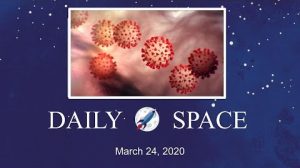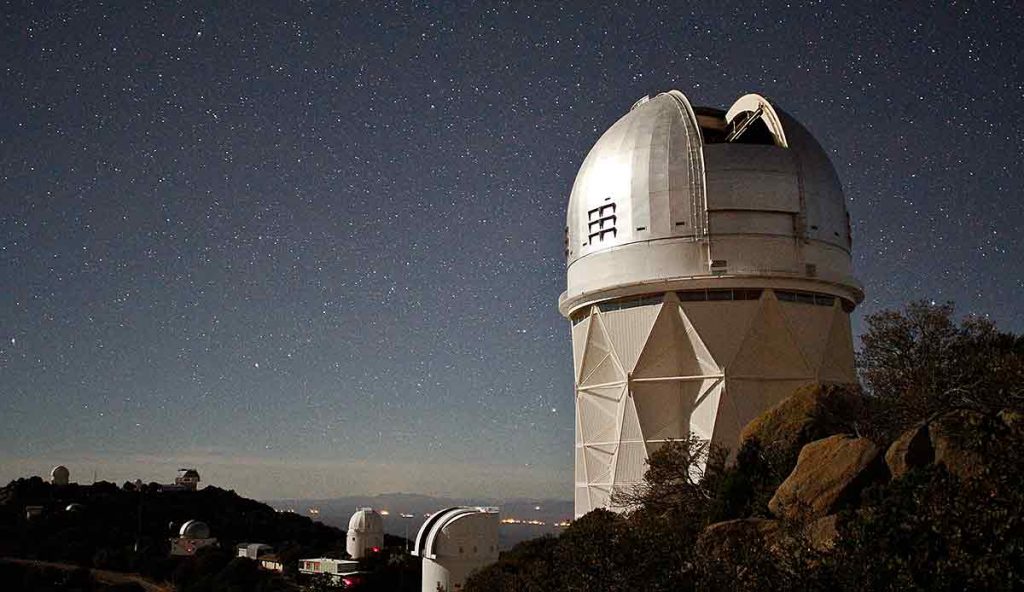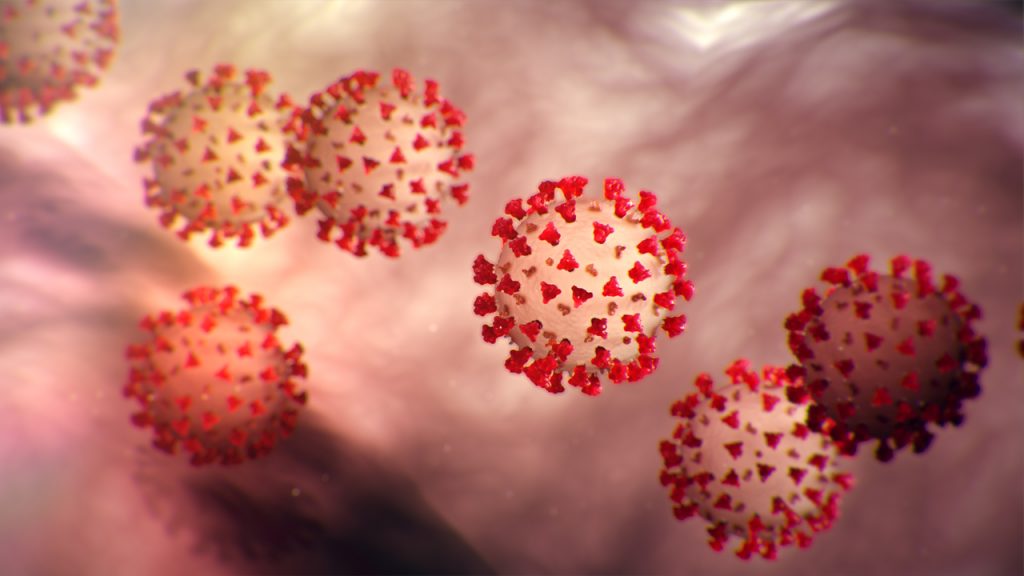
Today, Pamela gives us an update on how COVID-19 is affecting missions, programs, and other related science.
Links
How COVID-19 is Affecting Space Science
- COVID-19 update on AURA Operations and Facilities (AURA)
- NASA Leadership Assessing Mission Impacts of Coronavirus (NASA)
- NSF Letter to Community Regarding COVID-19 (NSF)
Transcript
This is the Daily Space for today, Tuesday, March 24, 2020.
Welcome to the the Daily Space, I am your host, Dr Pamela Gay, and I am here to put science in your brain. Most Mondays through Fridays either I or my co-host Annie Wilson will be here, bringing you a quick run down of all that is new in space and astronomy.
There is no denying it, we live in strange times where it is becoming necessary to define essential programs and people in ways we haven’t done before. During various government shutdowns, NASA and other government agencies sent home staff and locked down website behind “We are shut down” messages, but when it came to spacecraft construction, things kept on keeping on because launch windows wait for no rover.

Well, in this age of COVID-19 how we define essential is taking a very different shape. Essential is no longer “how do we keep our timelines intact”. Essential is now, “what is necessary to prevent Planet of the Apes from becoming our new reality.” Zookeepers are self-quarantining with their animals to keep themselves safe and keep their animals fed and cared for. Spacecraft and telescopes can – if shut down properly – be left alone, but if you stop construction… things can go sideways.
Different facilities are taking different approaches. AURA, the organization that runs many of the telescopes on Kitt Peak, in putting out daily updates, and continuing to observe where possible in the Hawaii and Arizona facilities, but the Vera Rubin Observatory, which we still think of as the Large Synoptic Survey Telescope (LSST), is being locked up and left abandoned, partially built, on its mountain in Chile, and all scientific operations are suspended at Cerro Tololo, SOAR, and Gemini South, all in Chile. The Space Telescope Science Institute in Baltimore continues to operate Hubble, but is otherwise in telework mode only, where “Essential personal” include those that keep space craft functioning. As for JWST, well, they pushed back the submission date for observing proposals, and that is never a good sign.

NASA has put out a statement on how their assessing mission impacts. While I’m generally skeptical about putting politicians and businessmen in charge of NASA, this is one of those times when having a leader used to looking out for his constituents – his people – is proving to be a grace. In the NASA statement, administrator Jim Bridenstine writes, “We are going to take care of our people. That’s our first priority. Technology allows us to do a lot of what we need to do remotely, but, where hands-on work is required, it is difficult or impossible to comply with CDC guidelines while processing spaceflight hardware, and where we can’t safely do that we’re going to have to suspend work and focus on the mission critical activities.”
To quote from the NASA statement, “NASA’s Mars 2020 mission, which includes the Perseverance Rover and Mars Helicopter, remains a high priority for the agency, and launch and other mission preparations will continue. Much of the work is being done by employees and contractors who work remotely across the agency. Assessments by agency leadership are underway for anyone required to work in areas under restriction, such as NASA’s Jet Propulsion Laboratory in Pasadena, California”.
Where things are getting tricky because they also have to balance against state mandates that are shutting down everything outside certain sectors. This is particularly relevant for the NASA Jet Propulsion Lab, which is in the LA hot spot. At least one friend who works there seems to have COVID and be recovering, but… as is the case in the US, since she doesn’t require hospitalization she can’t get tested.
Our heart breaks as we watch what is happening to our friends and families in the aerospace and science community in California. We must do everything we can to support life. This does mean JWST is going to experience further delays. At this time All integration and testing operations are suspended.
While I expect this to be more a topic for tomorrow’s Rocket Wednesday, I will add that work on Artemis, which is taking place in states with fewer restrictions, is continuing at a very limited level. In Texas, astronauts continue to train, and the ISS operations center continues to keep the folks on ISS company, and as far as we have been able to determine, NASA and SpaceX continue to anticipate a May launch of Crew Dragon from Florida to ISS with astronauts and supplies on board.
Scientists everywhere are now learning how to better use Zoom, Slack, and other digital tools to try and keep the science going. While astronomy and space science researchers are unlikely to do anything to help us survive these times, I personally hope that what we are doing can help keep your minds occupied as we together dream of the stars. I’m going to be working hard to keep my own programs going and using my lack of travel to catch up on old projects. Where I personally am panicking is not knowing how grant awards will be delayed. Like so many scientists, I don’t have a steady paycheck and work grant to grant and am rarely funded full time. Currently I have multiple NSF grants pending, and in looking to the NSF to seek information, I found a statement that didn’t answer my questions, but did leave me feeling better about our future. I’m now going to read this statement in it’s entirety:
In these times, we are given the opportunity to define ourselves and redefine humanities future. We can be afraid. I am afraid.
The choice becomes, do we let that fear control us, or do we choose to keep going and try and find ways to make the world a little better through our actions.
I am going to choose to keep trying to make it better. For me that means building a community where we can work together to help people learn and do science, and find companionship at their keyboard. I want all of you out their listening to know that no matter how much you may feel alone, you aren’t. We’re all in this together.
I’m one of those immuno-compromised people they keep talking about as “These are the people most likely to die.” I haven’t left my house since Feb 28, I am practicing social distancing in my house and won’t get within 6 feet of the people I live with. I’m graced with a house with enough rooms to pull this off. I live in a ramshackle old farm house that may not be heated really well, and leaks mice and birds, but it has space a plenty. Space to allow us all to isolate. That said, I had to tell someone wanting to chat on Saturday that I was peopled out. This happened because of this community, where we can come together to write software in one moment and to play Ticket to Ride in the next. If you feel alone, know that we’re here for you. It’s OK to be afraid. What matters is what you do after you acknowledge you are afraid. Join us, and at least bring someone a smile by sharing a picture of your pet. We can all get through this together.
<———————>
As part of helping keep us all occupied in these really weird times, we’re going to be hosting a lot of additional content on our Twitch channel, and we want to remind you that CosmoQuest has an active community on Discord where you can talk science and even find other people to join you in playing some online games. You can find links to everything that is going on at CosmoQuest.org.
Thank you all for listening. Today’s script was written by Pamela Gay, and the Daily Space is produced by Susie Murph. The Daily Space is a product of the Planetary Science Institute, a 501(c)3 non profit dedicated to exploring our Solar System and beyond. We are here thanks to the generous contributions of people like you. The best way you can support us is through Patreon.com/cosmoquestx Like us? Please share us! You never know whose life you can change by adding a daily dose of science.


 We record most shows live, on Twitch. Follow us today to get alerts when we go live.
We record most shows live, on Twitch. Follow us today to get alerts when we go live.